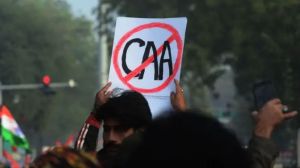Focus on Kashmiri plurality
If the appointment of another interlocutor to restart a process of dialogue with various groups in Jammu and Kashmir has been greeted by all...

If the appointment of another interlocutor to restart a process of dialogue with various groups in Jammu and Kashmir has been greeted by all of them, except the state government, with cynicism, he is not to be blamed for it. The cynicism arises mainly because of the manner in which interlocutors have been appointed and changed in the past. Not to speak of the much hyped K.C. Pant mission and the almost abortive role of Arun Jaitley, one has lost count of track II and track III diplomats who have been carrying on negotiations, openly and clandestinely, with various political groups in the state.
Going by the formal positions of the different parties to the Kashmir dispute, there is hardly any meeting point. They may not be able to change their respective stands, but a fresh look is needed by each of them over the methods they have been pursuing so far. The violence, for instance, has far outlived its utility. The militant movement has lost much of its international and local support. Pakistan’s capacity to continue what is called a proxy war or cross-border terrorism is bound to exhaust public patience. However, one should not expect surrender from the militants and secessionists after the loss of thousands of lives in what they presumed was a freedom struggle.
The “fairest ever election” has not brought an end to popular alienation in the Kashmir valley. True, sentiments for good governance and azadi did not clash in the election. But, whether a period of good governance can eventually subsume the azadi mentality remains to be seen. Moreover, the Mufti government got its mandate for preparing the ground for a dialogue with all sections of the people of the state.
While trilateral dialogue – between India, Pakistan and representatives of J&K state – has to be ruled out for the present, due to various reasons, in no case it will ever be possible unless its ground is prepared by a bilateral dialogue between the government and representatives of the Kashmir people. That again should be preceded by a dialogue between representatives of different regions and communities of the state.
At the moment even a dialogue within Muslims of Kashmir on the status of Jammu & Kashmir does not seem possible as a large number of people are being killed for their political beliefs. Shouldn’t the first stage of dialogue focus on the need to stop such killings? Its scope could then be enlarged to include killings of people for their religious beliefs. This is not a plea for a cease-fire between the militants and the security forces but merely to create a moral force against killing of unarmed and innocent dissenting civilians.
If Kashmiri Muslims achieve freedom of political expression, let them invite migrant Kashmiri Pandits who should be able to live in the Valley with dignity despite difference of religious and political beliefs. It is a necessary condition to restore the health of the Kashmiri identity— irrespective of final solution of the Kashmir problem. Leaders of Kashmir Muslims should then take an initiative to discuss their constitutional and political relations with non-Kashmiri Muslims and non-Kashmiri Hindus within the state who outnumber them. It must be a federal decentralised set up in which each ethnic and religious identity can flourish in friendship with one another.
After the state acquires a composite and harmonious personality, it can aspire for a satisfactory status for which it can negotiate with the government. Whether the leadership of different regions and communities can undertake the task on their own of evolving an appropriate set up for the state in which aspirations and interests of all of them can be reconciled or they need the help of a representative of the government, is for them to decide. But no central interlocutor can ignore the plural character of the state and its various identities as also their aspirations and interests in formulating his agenda for the dialogue and his recommendations to the centre. The new interlocutor needs a radical new approach if he is not to go the way of his predecessors.



- 01
- 02
- 03
- 04
- 05




























